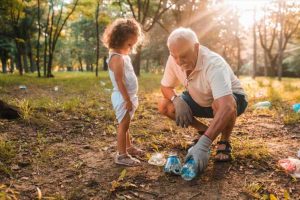Older generations 'confused' about the meaning of sustainability – but are still helping the planet, survey reveals

OLDER generations are the most confused about the meaning of ‘sustainability’ – but are actually doing more than younger adults to help the planet.
A study of 2,000 adults found a quarter of those aged 65 and over often hear about sustainability, but don’t really know what it means.
Despite this, 35 per cent are confident they are ‘doing their bit’ for the planet by recycling and saving energy.
But while 89 per cent of 18–24-year-olds claim being sustainable is important to them – just 23 per cent feel they are doing enough.
The over 65s are also most likely to recycle as much as they can (81 per cent), turn off lights when not in use (83 per cent) and use a ‘bag for life’ when shopping (82 per cent).
While 18–24-year-olds are least likely to separate out their recycling (34 per cent), switch off gadgets at the socket when not in use (34 per cent) and take shorter showers (22 per cent).
The research, which was commissioned by TePe to launch its Sustainability Report also revealed half of all adults believe they have a lack of knowledge about how to conserve resources and protect natural ecosystems.
Other confusing phrases according to adults are carbon neutral (41 per cent) and carbon footprint (35 per cent).
Alecia Brown, spokesperson for Tepe, said: “As part of our sustainability journey, it’s essential for us to understand the UK’s sustainability habits.
“Everyone knows they should do their bit to help the planet and the topics of being green and eco-friendly are spoken about daily, but the phrases themselves can be confusing to many people.
“Our actions aim to help our customers make more sustainable choices, without having to compromise on the quality of the products they use.
“Small swaps can make a difference to sustainability, including household items such as toiletries and indeed oral health products.”
The study also found 18–24-year-olds are willing to pay an average of 25 per cent more for a product which is sustainable, while over 65s would only pay an additional tenth.
And more than half of younger Brits have tried to educate others on how to be sustainable, with 54 per cent of them having informed their parents.
Overall, more than two thirds of all adults are more conscious about sustainability than they were five years ago and 39 per cent believe they have been more eco-friendly since the pandemic began.
The research via OnePoll found positive changes during this time include driving less (42 per cent), using leftover food (22 per cent) and doing fewer loads of clothes washing (21 per cent).
Other changes people hope to make in the next five years are switching all lightbulbs to LED (30 per cent), shopping ‘packaging free’ (28 per cent) and buying an electric car (26 per cent).
Alecia added: “Carbon neutral is one of the most confusing phrases for people of all ages, so we want to be super clear in what we are doing as a company and support consumers with their own education.
“Our commitment includes setting a climate neutrality target for product and packaging, striving for increased circularity throughout our operations and raising health awareness through education.
“The launch of our TePe GOOD range is the next step on our journey aiming for carbon neutrality.
“Our sustainability efforts will go beyond our own product range as we look to educate and support consumers on making greener choices, through tips and advice, working with sustainability experts.”
To learn more about carbon neutrality see here – www.tepe.com/uk/sustainability-at-tepe/sustainability.
Source: Read Full Article


